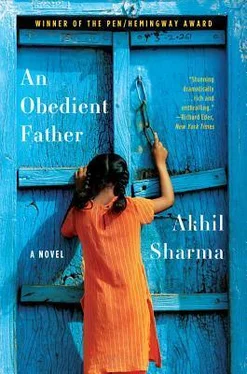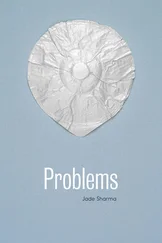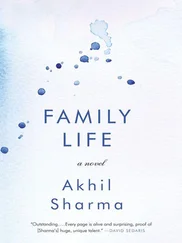received a job offer in Bombay. Ma did not want to send me that far away with someone we did not yet know. The other, who drove a Honda motorcycle, was handsome, but he had Hed about his income.
Those introductions, like this one, were held in Vikrant, a two-story dosa restaurant across from the Amba cinema. I liked Vikrant, for I thought the obvious cheapness of the place would be held against us. The evening that I met Rajinder, Vikrant was crowded with people waiting for the six-to-nine show. We sat down. An adolescent waiter swept bits of dosa from the table onto the floor. Footsteps upstairs caused flecks of blue paint to drift down.
The dinner began with Rajinder's mother, a small round woman with a pockmarked face, speaking of her sorrow that Rajinder's father had not lived to witness his two sons reach manhood. There was a moment of silence. Pitaji tilted slightly forward to speak. "It's all in the stars. What can a man do?" he said. The roughness of his voice, the danger that his enormous body always projected, sharpened my anxiety. I shifted toward Ma.
The waiter returned with six glasses of water, four in one hand, with his fingers dipped into each. Rajinder and I did not open our mouths until ordering our dosas. At one point, after a long silence, Pitaji tried to start a conversation by asking Rajinder, "Other than work, how do you like to use your time?" Then he added in English, "What hobbies do you have?" The door to the kitchen in the back was open. I saw two boys near a skillet, trying to shove away a cow which must have wandered off the street into the kitchen.
"I like to read the newspaper. In college I played badminton," Rajinder answered in English. He smoothed each word with his tongue before letting go.
"Anita sometimes reads the newspapers," Ma said.
The food came. We ate quickly.
Rajinder's mother talked the most during the meal. She told us about how Rajinder had always been favored over his older brother — a beautiful, hardworking boy who obeyed his mother like God Ram. Rajinder had shown gratitude by passing the exams to become a bank officer. Getting from Bursa to Delhi was three hours
in the bus every day. That was very strenuous, she said; besides, Rajinder had long ago reached the age for marriage, so he wished to set up a household in the city. "We want a city girl. With an education but a strong respect for tradition."
"Kusum, Anita's younger sister, is finishing her Ph.D. in molecular biology. She might be going to America in a year, for further studies," Ma said slowly, almost accidentally. "Two of my brothers are engineers. One is a doctor." I loved Ma very much in those days. I thought of her as the one who had protected me all my life. I believed that she had stayed with Pitaji for my sake. Therefore, whenever I heard her make these incredible exaggerations — the engineers were pole climbers for the electricity company while the doctor was the owner of an herbal medicine shop — to people who might find out the truth, I worried for her. Ma did not believe her stories, so she was not crazy. Ma just had no control over her anger. I looked down at the table.
Back then I felt Ma believed that I had partially seduced Pitaji. I thought Ma's aimless anger came from having to sacrifice herself for someone like me.
I put my hand on the back of Ma's neck. I liked to touch her. She was the person I loved most in the world.
Dinner ended. I still had not spoken. When Rajinder said he did not want any ice cream for dessert, I knew I had to say something. "Do you like movies?" It was the only question that came to me.
"A little," Rajinder answered seriously. After a pause he added, "I like Amitabh Bachchan most."
"Me too," I said.
Two days later. Ma asked if I minded marrying Rajinder. We were in the living room. Ma was sitting on the sofa across from me. I thought. What is the hurry, after all? I'm just twenty-one. But I believed that Ma was worried for my safety at home.
I did not think my marriage would occur. Something was sure to
come up. Rajinder's family might decide my B.A. was not enough. Rajinder might suddenly announce he was in love with his typist.
The engagement took place a month later. Although I was not allowed to attend the ceremony, Kusum was. She laughed as she described Pitaji, the way his blue jacket rode up when he lifted his arms, revealing that the shirt he wore underneath was short-sleeved. Rajinder sat cross-legged before the pundit on the floor. He was surrounded by relatives. The room was light pink. Rajinder's uncles, Kusum said, pinching her nostrils, smelled of manure.
Only then did I understand that Rajinder was to be my husband. I was shocked. It was as if I were standing outside myself, a stranger, looking at two women sitting on a brown sofa in a wide bright room. Two women. Both cried if slapped, laughed if tickled, but one had finished her higher secondary when she was fifteen, was already doing her Ph.D., with the possibility of going to America; the other, her older sister, who was slow in school, was now going to marry, have children, grow old. Why was it that when Pitaji took us out of school saying that we were all moving to Beri, Kusum, then only in third grade, reenroUed herself, while I waited for Pitaji to change his mind?
As the days till the wedding evaporated, I slept all the time. Sometimes I woke thinking the engagement was a dream. At home the marriage was mentioned only in connection with the shopping involved. Once Kusum said, "I've read you shouldn't have sex the first night. Just tell him, 'No loving tonight.' "
The wedding occurred in the alley outside the compound where we had a flat. The pundit recited Sanskrit verses. Rajinder and I circled the holy fire seven times. When told, we put necklaces of marigolds around each other's necks to seal the marriage. I was wearing a bright red silk sari which had the sour smell of new cloth. There were many people surrounding us. Movie songs blared over the loudspeakers. On the ground was a red dhurri with black stripes. The tent above us had the same stripes. The night traffic passing outside the alley caused the ground to rumble.
The celebration lasted another six hours, ending about one in the morning. I did not remember most of it till many years later. The two red thrones on which we sat to receive congratulations are only in the photographs, not in my memories. There are photos showing steam coming from people's mouths, so it must have been especially cold. For nearly eight years I did not remember how Ashok and his mother, Ma, Pitaji, Kusum, Rajesh got into the car with us to go to the dharamshala, where the people from Rajinder's side were spending the night. Nor did I remember walking through the dharamshala's halls, passing rooms where people were asleep on cots, mattresses without frames, blankets folded twice before being laid down.
I did not remember any of this until recently. I was wandering through Kamla Nagar market in search of a dress for Kusum's daughter and suddenly felt the shock of my shopping while Pitaji was in his room waiting to die. The waste. My life was a waste. I was standing on the sidewalk looking at a display of hairbands. I thought of Kusum's husband, a tall yellow-haired American with a kind face, who I believed had taught Kusum kindness. Standing there, I thought of the time I loved Rajinder. I started to cry. People brushed past. I wanted to sit down on the sidewalk so that someone might notice and ask whether anything was wrong.
I did remember Rajinder opening the blue door to the room where we spent our first night. Before we entered, we separated for a moment. Rajinder touched his mother's feet. His mother embraced him. I touched my parents' feet. As Ma held me, she whispered, "Earlier your father got drunk like the pig he is."
Then Pitaji put his arms around me. "I love you," he said in English.
Читать дальше












